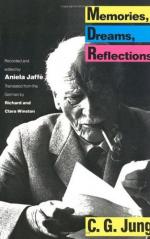
|
| Name: _________________________ | Period: ___________________ |
This test consists of 15 multiple choice questions and 5 short answer questions.
Multiple Choice Questions
1. Why were patients allowed to leave the asylum?
(a) They felt better after time away from the stresses that brought on their illness.
(b) Their families were convinced to take them back.
(c) They agreed to return at the first sign of abnormal behavior or feelings.
(d) The asylum could not keep them beyond a certain time.
2. What did Jung's father's dislike for Jesuits probably stem from?
(a) Jesuit treatment of Natives in North America.
(b) The Catholic/Protestant divide.
(c) A Jesuit had killed his father.
(d) Centuries of Catholic persecution.
3. How did writing this book change Jung's life?
(a) He recalled things he had forgotten entirely.
(b) He purged memories that had been making him sick.
(c) He came to terms with his dislike for his father.
(d) He became more objective about it.
4. How was Jung's thesis received?
(a) It was derided.
(b) It was accepted.
(c) It was rejected.
(d) It was praised highly.
5. What was Nietzsche's reputation in Basel?
(a) He was vilified.
(b) He was not always spoken well of.
(c) He was revered.
(d) He was still unknown.
6. What did Jung's experience show him about Freud's practices?
(a) They could be applied successfully in limited cases.
(b) They were potentially dangerous.
(c) They were harmful.
(d) They were useful.
7. What does Jung say he was entirely ignorant about in his childhood experience?
(a) The family's shameful history.
(b) The family's reputation.
(c) The family's wealth.
(d) The family's poverty.
8. What does Jung say he realized held the greatest meaning for him as he grew older?
(a) His wife and family.
(b) His publications and his reputation.
(c) His relationship with Freud.
(d) His inner life and inner vision.
9. How did Jung's beliefs about God affect his thinking?
(a) Jung felt deeply guilty and afraid of damnation.
(b) It made Jung feel like a hypocrite, since he didn't believe what he was saying in church.
(c) Jung tried to stop thinking certain things for fear of blasphemy.
(d) Jung fostered his disbelief in private, and prepared to run away from his family.
10. How did Jung refer to his autobiography while it was being written?
(a) As "My Red Book".
(b) As "My gospel".
(c) As "My story".
(d) As "Aniela's project".
11. How old was Jung when his parents had his baby sister?
(a) Nine.
(b) Seven.
(c) Five.
(d) Three.
12. What were Nietzsche's adherents like in Jung's experience?
(a) There were crowds of worshipful followers.
(b) No one followed Nietzsche's thoughts.
(c) There were only a handful of people who took Nietzsche seriously.
(d) He knew two followers who were both homosexual.
13. What events did Jung attend regularly for two years after the life-changing event?
(a) Table tappings.
(b) Church services.
(c) Pagan rituals.
(d) Magic shows.
14. How did Jung attempt to approach God?
(a) In his feelings.
(b) Through piety toward his parents.
(c) Through books.
(d) Through church rituals.
15. What kind of formative event shaped Jung?
(a) A religious question that made him secretive.
(b) An ethical question that made him suspicious.
(c) A financial question that made him thrifty.
(d) A familial question that made him proud.
Short Answer Questions
1. How did Jung pay for school?
2. How did Jung feel about meeting Freud?
3. What did Jung develop as a result of his childhood experience?
4. How did Jung feel about his mother?
5. What did the event convince Jung to believe?
|
This section contains 609 words (approx. 3 pages at 300 words per page) |

|




